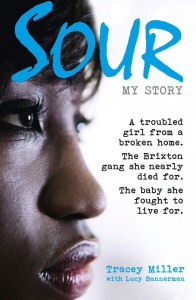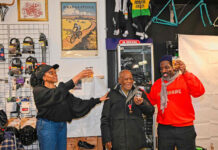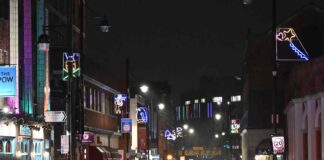
“I found writing it very therapeutic, and it made me realise that I was a little devil back then”, says ex-gang member Tracey Miller about her gritty, no-holds-barred book ‘Sour’ as we meet in Brixton’s POW bar.
A former member of the notorious, male Brixton gang the Younger 28s, Tracey co-wrote the book with journalist Lucy Bannerman about her criminal and often shocking past.
“Doing the book took me back to a place that I thought I’d long left behind,” she explains. “Who I am now is not who I was then, 20-something years ago.”
Being part of a violent gang was, for Tracey, a way of regaining control over her own life as well as “a call for help”. Feeling powerless in her home life, the Younger 28s gave her an outlet to control her peers and instil fear.
“My mum was always medicated on sleeping tablets so she didn’t notice if I left in the night. Every day I would decide whether I wanted to make money and if I did – who should I rob? My doorbell would always ring – the house was like a little community centre, my mum used to go mad. Then we would be several people (mainly me and the boys) and whoever came up with the best idea, then we would go out and do it. Sometimes, we would just take a walk and a crime would be committed during that.”
Robbing aside, Tracey is keen to emphasise that she would also use her fearless side for good. “I did have a kind side; if I saw a woman being assaulted by a man I would help her out. Or, if I saw an old woman struggling with her shopping, I would help her carry.”
Tracey is keen to distance herself from the younger self who ended up in prison following a stabbing. “People who meet me see that I am not that character in the book so they tend to like me – I hope you will too,” she says hopefully. Now a full-time carer for her mum and a mother of two daughters, aged 16 and three, Tracy has put her gangster past firmly behind her. These days, she actively tries to get young people to turn their backs on gang culture by speaking at schools, young offenders’ institutions and colleges.
“If I hadn’t had the gang lifestyle, I couldn’t do what I do now and speak to youth about it,” she says, continuing, “but I also feel that I have let myself down, I could have applied myself to becoming a successful business owner for instance. I was industrious in the wrong way.”
“I was not under any illusions, but I was a girl, a tomboy; so was I accepted because I was a girl that they fancied, or was I accepted because of my badness? Looking at that; was I a victim? I have learnt a lot looking back.”
One of the lessons learnt is how to keep tabs on her own daughter to make sure she doesn’t go down the same route.
“My 16 year-old…” Tracey trails off looking reflective. “Well, I operate a zero-tolerance household, it’s a case of ‘I talk – you listen’ which functions very well. It’s not a case of ‘if you don’t listen to me I will throw you out and let society deal with you’ – no it’s a case of me making your life hell!” There is a smile, but you can sense the serious undertones of what she is saying.
Family is a topic close to Tracey’s heart. Her relationship with her mother features heavily in her book, a relationship that shows her softer side.

“I’ve had to deal with my mum’s schizo-affective disorder since I was six weeks old”, explains Tracey. “Although I am now 36, every time she has an episode, it takes me back to being that scared little child on edge in a corner.”
The Younger 28s are no longer an active gang in Brixton, and the few ex- members Tracey kept in contact with have praised her for speaking out about her past.
Despite successfully managing to extract herself from a violent lifestyle, Tracey admits that it has left her “desensitised”. ”I live from day to day now and nothing can really shock me. I have had a life full of disappointing chapters, so I expect things to go wrong. Even when things go well, I can’t really appreciate it.” She hold ups a half drunk glass of sparkling wine with a wry smile; “I am a pessimist, my glass is, quite literally, always half empty, can’t you see?”
Is there anything she misses about her past? “I miss the fact that many people who were alive back then, have now passed away. I miss them, or miss speaking to them. I miss the whole happy go lucky, free vibe. I have so much responsibility now. I miss the freedom.”
What about the future? How easy is it to stay away from her old haunts and habits?
Tracey’s face is serious. “Prevention is better than cure, and what can I really get into? I’m always indoors, I’m a house hermit unless I go to my mum’s, speak at schools or take my kids to school. And I like it that way. If I am totally honest with you, the devil always sits on your shoulder but it’s down to you not to listen. So, I can’t say that I’d never stab someone again if I went into a serious altercation, or if my kids’ lives were at stake.”
I notice Tracey’s collection of tattoos. Some with clear Islamic meanings, one spells out ‘Hottie’ (“I was showing off myself”), her daughters’ names, eye brows (“I am kind of regretting them because I am stuck with this shape forever now”) and a small inking on her wedding finger. She looks at her finger. ”My youngest daughter’s dad proposed to me and we were engaged for a bit. But, I am not the easiest of characters, and for me to settle down with someone takes that extra special character because I am hard work. “
She flashes a cheeky smile. “But I’m happy. I’m not one of those women who need a guy to complete them. I could go out and get you know…but I’m all right. You shouldn’t have to compromise. So I am single, but Ann Summer’s has a good selection so I’m ok!”
‘Sour’ (HarperCollins) by Tracey Miller and Lucy Bannerman is out now.
Tracey regularly gives talks at schools and rehabilitation centres about her experiences, encouraging others not to follow her path and how to get lives back on track. She’s also involved with various related charities including Get Outta The Gang, Mothers Against Guns, S.T.O.P.














